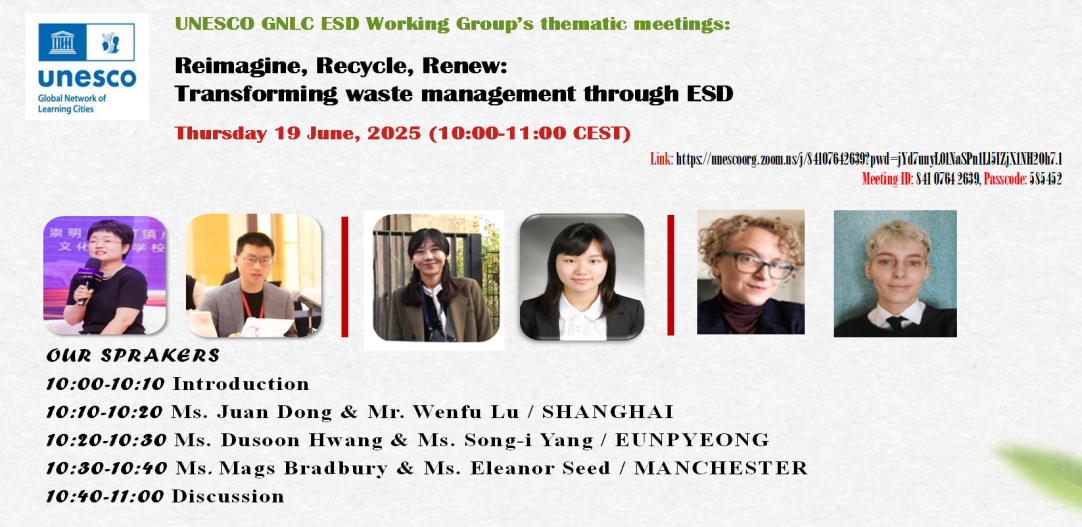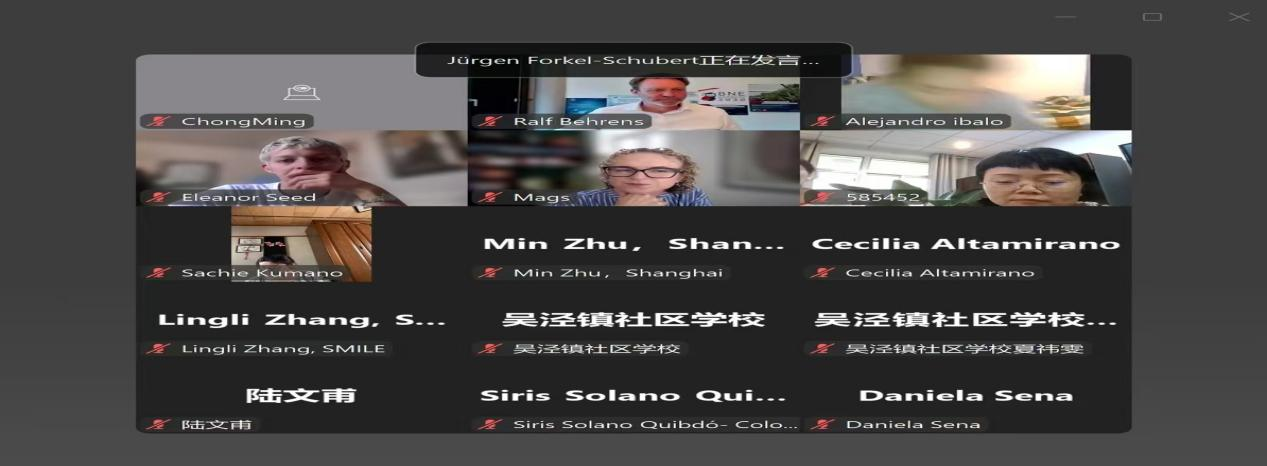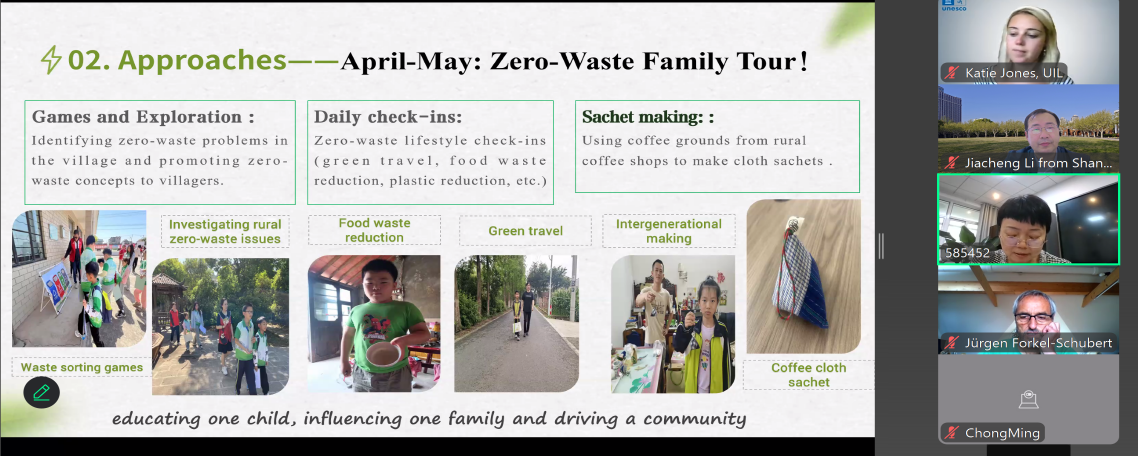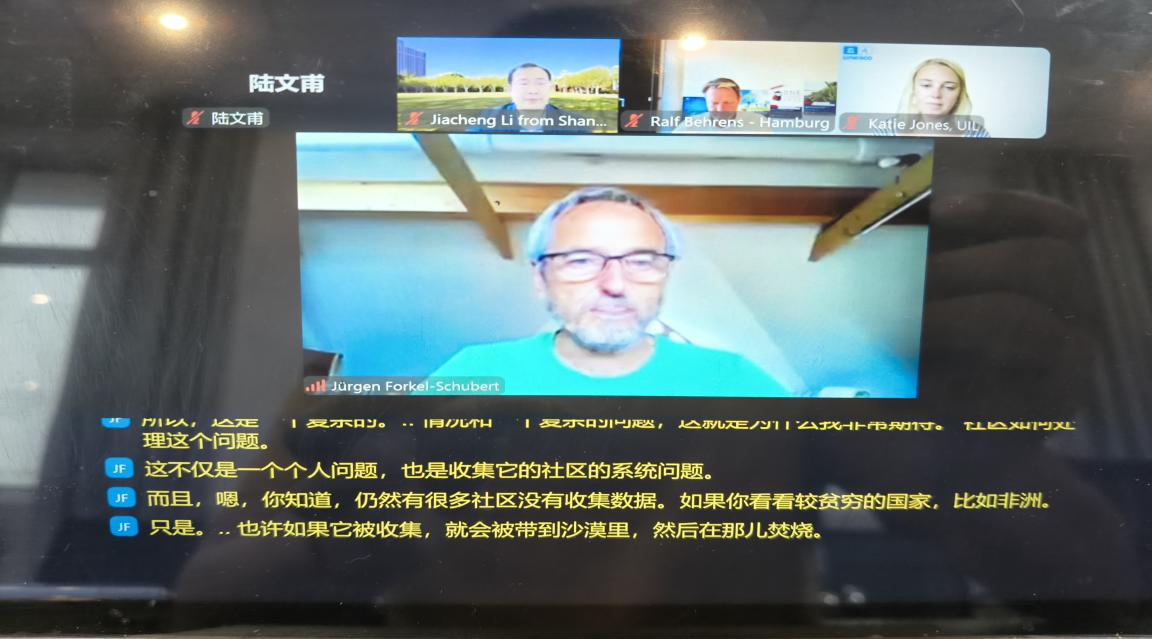East side of 7th Floor, No. 3663, North
Zhongshan Road, Shanghai, China, 200062
Tel: +86 21 6223 2322
www.smile.ecnu.edu.cn
On the afternoon of June 19, 2025, the Shanghai Municipal Institute forLifelong Education(SMILE), the Shanghai Elderly Education Curriculum Research and Evaluation Guidance Center, and the Chongming “Carbon” Classroom Project Team (Chongming Community College, Chongming Miaozhen Adult Education School, and Chongming Adult Vocational Education Association) jointly participated in the UNESCO Global Network of Learning Cities (UNESCO GNLC) Education for Sustainable Development (ESD) Thematic Meetingthemed“Reimagine, Recycle, Renew”.
The meeting featured keynote speeches by experts, scholars, and practitioners of ESDfrom three learning cities: Shanghai, China; Eunpyeong, South Korea; and Manchester, the United Kingdom. The session was chaired by Mr. Jürgen Forkel-Schubert, a senior ESD expert from Germany, with Ms. Katie Jones, project advisor at the UNESCO Institute for Lifelong Learning(UIL), and representatives from GNLC member cities including Japan, South Korea, the United Kingdom, Ireland, and Argentinaas participants.

Professor Li Jiacheng, Executive Vice Presidentof SMILE, Associate Professor Zhu Min from the Institute of Vocational and Adult Education at the Facultyof Education, East China Normal University(ECNU), Ma Juan, Deputy Dean of the Chongming Community College (Rural Revitalization and Community Governance College), Jiang Chunlei, Principal of the Chongming Miaozhen Adult Education School (Miaozhen Branch of Rural Revitalization and Community Governance College), Ma Shijuan, President of the Chongming Adult and Vocational Education Association,and Yang Ziyi and Yang Yining, postgraduatestudents from East China Normal University, also attended the meeting.

Dong Juan, Deputy Principal, and Lu Wenfu, teacher, from the “Carbon” Classroom Project Team in Chongming District, Shanghai, introduced the “Zero-Waste Rural Action” case. The project team collaborated with the international zero-waste sports event IRONMAN 70.3, targeting 10 familieswith left-behind children in Xinle Village, Xincun Town, and partnered with government, business, and community sectors to develop zero-waste course resources that integrate knowledge, culture, and experiential learning. Through the “Three Actions” (Community Action, Family Action, and Factory Action) series of activities, the project implemented zero-waste courses, explored a co-learning and mutual learning model where “the children lead adults”. This approach has not only created a ripple effect of “Educating one child, Influencing one family, and Inspiringan entire community,” but also leveraged the power of community education to promote zero-waste rural development, injecting momentum for ecological civilization construction and sustainable development into remote rural areas.

Dusoon Hwang from Eunpyeong District, South Korea, shared recent activities in their local community that leverage AI to promote sustainable development:they have collaborated with banks to conduct community waste recycling initiatives, using digital intelligent machinery to recycle items such as plastic water bottles, and offering cash refunds as an incentive to encourage residents’ sustainable behaviors.
Dr. Mags Bradbury and Ms. Eleanor Seed from the University of Manchester in the UK designed a campus project called “The Rubbish Partnership” based on the reality of garbage accumulation on campus. The project aims to establish collaborative relationships within and outside the school to reduce garbage production, cultivate sustainable development and environmental awareness among college students, and build a green campus.

Based on the relevant experiences shared by the three cities, participants engaged in in-depth discussions on topics such as reshaping concepts and circular regeneration, and expressed great interest and high recognition for Shanghai’s practical achievements. The representatives noted that Shanghai’s “Zero-Waste Village” initiative has not only strengthened communication between generations within rural familieswith left-behind children but also effectively raisedawarenessof “zero-waste” at community, social, and international levels, fulfilling the commitment of “Community Education fora Sustainable Society”. The Shanghai case has provided valuable experience and insights for global “Zero-waste City” initiatives in addressing potential psychological problems, delivering tangible benefits to stakeholders, ensuring project sustainability, and securing strong government support.
Written by: Zhu Min, Dong Juan
Reviewed by: Zou Wen, Li Jiacheng